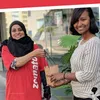How a CA and a fashion designer founded preservative-free, ready-to-cook food business during the pandemic
Founded by neighbours Aakanksha Satnalika and Khushbu Malu, Pune-based JustCook offers ready-to-cook regional Indian food products priced between Rs 60 and Rs 150.
Gone are the days of family members gathering together to cook and enjoy exquisite Indian cuisines, as people got caught up in the fast-paced city life. But that does not mean the appetite for authentic Indian food is lost with time.
Pune-based neighbours Aakanksha Satnalika and Khushbu Malu can vouch for that as they’ve tried various shortcuts to cook different meals in between their respective full-time jobs as a fashion designer and a chartered accountant.
“Indian cuisine is complicated and can be time-consuming to prepare. And the cuisine is losing its shine in most nuclear families today. Existing ready-to-cook food in the market contain artificial flavours and preservatives to have an extended shelf,” Aakanksha tells HerStory.
On New Year’s eve of 2019, the duo decided to start to make authentic Indian cuisine meals available in a jiffy.
In early 2020, the COVID-19 outbreak served as a blessing in disguise for their budding venture as engaging in food experiments became a trend during the initial days of the nationwide lockdown, and JustCook’s products were getting picked up from various kirana stores and ecommerce sites.
The duo is now tapping into India’s ready-to-eat market that is expected to generate a revenue of Rs 68.47 billion by 2024 and grow at 16.24 percent CAGR between 2019 and 2024.

The JustCook journey
Aakanksha and Khushbu began by developing the right composition of ingredients for Fresh Idli Dosa Batter, using the traditional way of stone grounding.
After nearly 25 rounds of iteration in three weeks, they finalised a sample that ensured taste, freshness, as well as a fluffy and soft texture. The sample was then sent for a lab test to ensure shelf life and nutritional values, followed by designing the logo and packaging. To get a taste of how customers would take to the products, they offered the batters for their neighbours to get first-hand feedback.
Today, the brand offers a wide range of products, including Khaman Dhokla Mix, Instant Sambar Mix, and Chutneys, within the price range of Rs 60 to Rs 150.
Operating on dual models of B2B through resellers and B2C, the products are sold through a network of offline and online retailers. This includes over 15 supermarkets and kirana stores, along with online platforms like Superdaily, BigBasket, Flipkart, and Amazon.
Most of its direct-to-customer sales happen in their neighbourhoods in small volumes so as not to lose touch with the customer response and feedback.
“Initially, kirana store owners would not take us, as they are not used to two women seriously approaching them to talk business. We faced considerable challenges in the male-centric entrepreneurial world with suppliers also questioning us, but we continued and stuck to the work,” Aakanksha shares.

Idli Dosa batter is Pune-based JustCook's first product
COVID-19 and the road ahead
The arrival of the brutal second wave of COVID-19 meant that the startup’s workers could not come to work, causing a strain on an already small team of seven people.
“We got numerous messages from our customers asking for the product during this time, but we were out of stock for two weeks due to operational challenges - both in terms of manpower and raw material shortage,” Khusbu says. The duo has since resumed business as usual.
In less than a year of entering the market, JustCook has sold over 10,000 packets so far, clocking a monthly revenue run rate of Rs 1-1.5 lakh in FY21.
With the founders making an initial investment of Rs 5-10 lakh from their savings and with help from their husbands, the brand has recently raised Rs 2 million from Pune-based angel investors.
It is now looking to stabilise the operations, penetrate further into Maharashtra, diversify product offerings of food from different regions, and hopes to raise an additional Rs 20-25 million by next year.
“The market has not been steady in the past year because of the COVID-19 pandemic. However, the consumer trend for ready-to-cook food has picked up. As a very young player in the sector, we aim to achieve a wider reach and our key going forward will be about having a strong distribution channel,” Khushbu concludes.
Edited by Kanishk Singh









